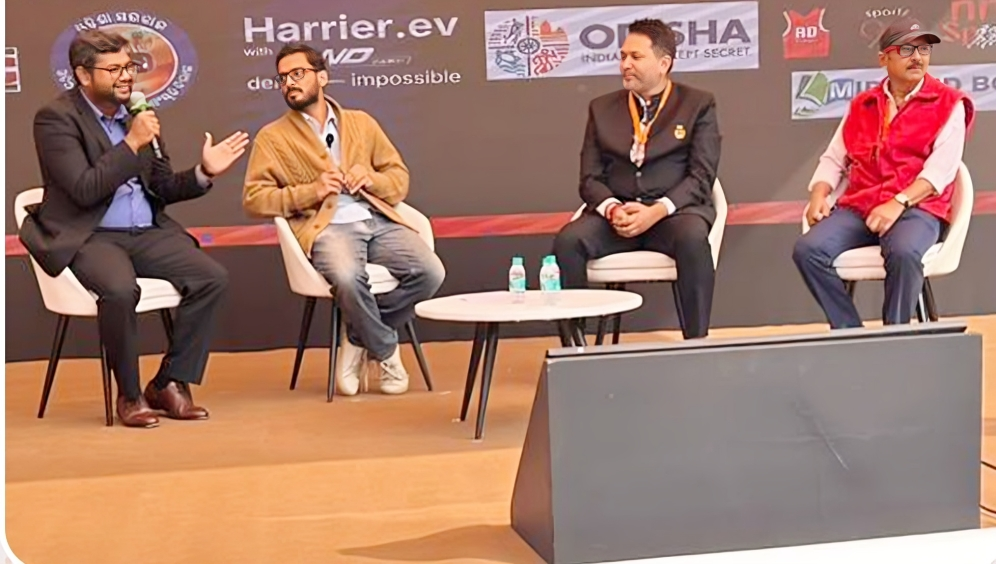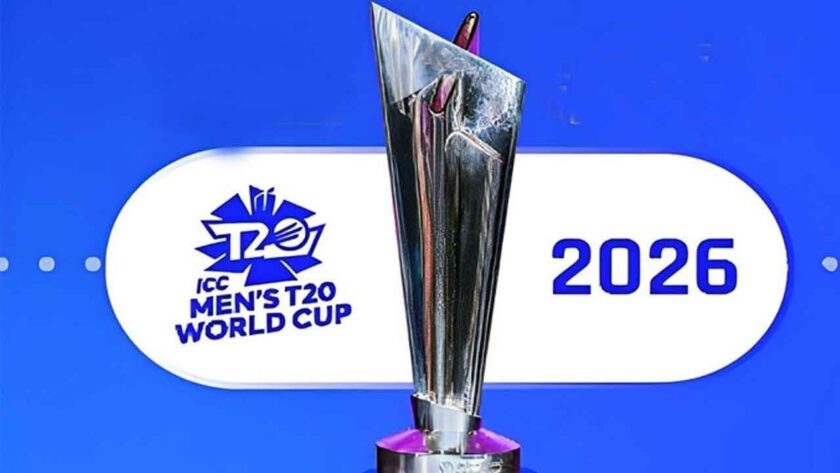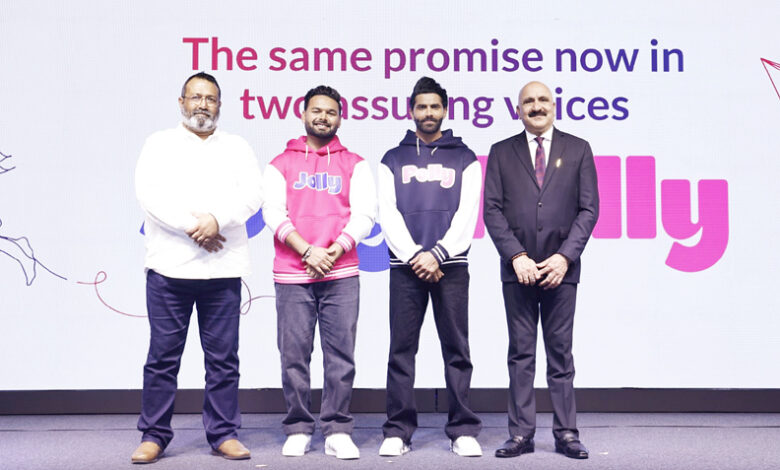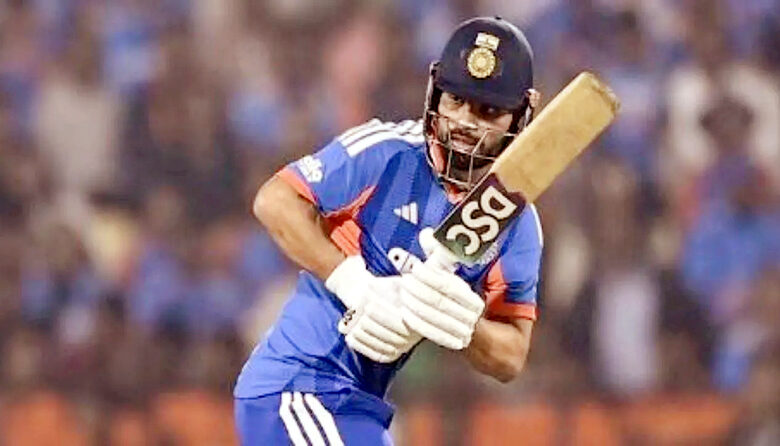New Delhi: The spotlight of Session 3 at the Ekamra Sports Literature Festival turned sharply towards the state of Indian and South Asian football. It was a discussion marked by rare honesty, warmth, and the lived experience of those on the frontline of the sport, exploring the delicate, and often frustrating, balance between the sheer beauty of the game and the deep-seated flaws in the system that governs it.
Anchoring the session was Arka Bhattacharya, a well-known football journalist and coach, who set the stage by asking for a show of hands: “How many Indian football fans in the house?” The visible, yet small, number of raised hands underscored the very struggle the panel was about to discuss.
The stage brought together three distinguished voices:

-
Sandeep Menon, author of ‘Sacred Grounds: A Journey Through People’s Football in India,’ a book celebrating the players, communities, tournaments, and traditions that form the soul of the sport.
-
Jaydeep Basu (Jay Da), a legendary figure with four decades as an Indian football journalist, whose new book, ‘Who Stole My Football,’ asks necessary, uncomfortable questions.
-
Prithvijit Das (Prit), the CEO of Inter Kashi, bringing the perspective of an administrator who built a champion club from the ground up and steered it into the ISL.
The collective sentiment was clear: football in South Asia thrives not because of its administration, but because of the people who continue to fight for it.
Building From Zero: Inter Kashi’s UP Challenge
Arka Bhattacharya began by addressing Prithvijit Das of Inter Kashi, an organization attempting the “gargantuan task of building culture” in Uttar Pradesh, a region of 250 million people and historically not a core football hub.
“Did you envision your title-winning season’s aftermath to be like this?” Arka asked, referring to the club’s recent battles both on and off the pitch, including some fought in Switzerland.
Prithvijit responded with unexpected positivity:
“I think we were very fortunate. Whatever happened outside the pitch helped us build a huge amount of fan base… if this whole drama did not happen, a Netflix series could not have happened or maybe will happen in future. But it definitely gave a lot of eyeballs to the club… it helped to show that if you’re true and you play by the book, eventually you win.”
On the difficulty of starting a club from scratch in UP, Prithvijit acknowledged the challenges but highlighted the opportunity: “The biggest advantage is there’s no football. So you can start and do where you think you can do and what you want to do.” He noted the surprise discovery of a huge, untapped football culture in UP’s villages and towns—a lack of pathway and awareness, but certainly not a lack of interest.
Inter Kashi’s long-term vision is ambitious and focused on local development:
“We are very clear as a club—it’s a UP club. And by 2030, we want to have at least 70% of the senior team, boys and girls from the state… Importing from different states to me isn’t the right way to do it. Everyone should be in their own state and you develop your state. That’s how you would get fans to the ground.”
Four Decades of Decline: The League vs. Activity
Next, Arka turned to the veteran, Jaydeep Basu, asking about the state of Indian football “before the league” (referring to the National Football League, NFL, which began in 1996).
Jaydeep reminisced about a bygone era of bustling activity:
“Indian football was the activities were much more. If you look at ’96 season, there was such a problem that all the players were playing at least 60 matches… The All India Football Federation had to issue coupons of 50 matches for the top players. The moment they finished 50 matches… they cannot play.”
He recalled a time when even an India captain like Basu Mundal was forced to sit out of the Durand Cup after just two matches because he had hit his 50-game limit.
The Leagues, while necessary by AFC mandate, had an unintended consequence:
“The league has… restricted the activities, and post-2014 when the Indian Super League was introduced and when it became the premier league in 2019… the activities has drastically come down for these senior players.”
Sacred Grounds: Mizoram and the Culture of Game Time
Sandeep Menon offered a counterpoint to the administrative chaos by detailing the vibrant grassroots culture he documented for his book, particularly in Mizoram and Manipur.
Responding to Jaydeep’s point about 50 matches, Sandeep stated that these two northeastern states might be the only places where a player could still potentially achieve that level of game time.
Mizoram, he noted, is a football fan’s paradise:

“Mizoram was beautiful man… everybody is involved in playing, everybody… The villages are so they have this tournament… Men, women, everybody, children, all of them sitting in the stands and the matches are happening, it’s live telecasted.”
He emphasized that the secret to the Northeast’s consistent player production is community pride and a phenomenal number of tournaments. He recalled a local WhatsApp group discussion during the Santosh Trophy: Should Mizoram continue or get knocked out so the players can come back and play for their localities? The consensus: “Just get knocked out and come play for our locality.” This anecdote highlighted how deeply the pride is woven into their local football.
The vital takeaway, which both Sandeep and Prithvijit agreed on, is game time. Sandeep gave the example of Karnataka, which has a better ecosystem now because of local organizers running leagues that ensure kids get 30-40 games a year.
The Vicious Circle: Administration, Human Resources, and Crisis
The discussion then moved to the core problem: the governance of the sport at the state and district levels.
Jaydeep explained the difficulty for the All India Football Federation (AIFF) to regulate state affairs:
“It’s certainly not possible… India is a such a big country… Indian football’s biggest problem is human resource. You don’t get the right people… There are several states in the country who are governed by people who shouldn’t be there actually… Nobody cares.”
The problem is a vicious circle tied to the vote politics that governs the federation: “Anybody who is running the show in Delhi… they have to also keep in mind that after four years they have to face another election. So that area is a very gray area. Even if I am there I would be bothered about my next election. So I can’t really blame them.”
This administrative failure has led to the current crisis—the suspension of domestic leagues.
Jaydeep did not mince words:
“I think it’s a what’s going on is a criminal offense at the moment—the stopping of domestic football completely… Indian football is going through a lockdown period. That’s all. So it’s a criminal offense… It’s absolute downright poor governance.”
He clarified that a FIFA ban is not the immediate risk; the greater shame is that India has stopped playing football even “for fun.”
No Clarity, No Momentum: The Club Administrator’s Nightmare
The absence of a clear league calendar and the surrounding administrative chaos is having a devastating impact on clubs like Inter Kashi.
Prithvijit shared the alarming internal discussions taking place:
“I am now thinking and this is what the ownership is also thinking: Did we invest in a wrong sport? Why did we get into this thing? I mean, is it worth this whole stress to take… It’s a very serious discussion we having internally because you never know. I mean every day we hear that there will be a solution tomorrow… Should we continue doing the first team, should we keep waiting or should we forget? Close down the club and just focus on the academy.”
He strongly pushed back against the blame being leveled at players and coaches when the administrators are the root cause:
“How can you blame a team who’s just come for a 10-day preseason or warm-up and go for a match? Add to it the players don’t know if they will get the salaries. They don’t know if they have contracts… I think we should, as a community, look at the positive and shut out the negative… just do something and close it and say, okay, in the next one hour we will give you the solution and then we start on football.”
The Player’s Position and The Way Forward
Sandeep and Jaydeep concluded the session by addressing the controversy around player salaries and the market correction. Sandeep defended the players, arguing that the finger should be pointed at the agents and club owners who are willing to overpay in a “vicious cycle” driven by the chase for trophies.
He also backed Prithvijit’s point on the lack of match fitness:
“You can’t not play for months and then train for 10 days and then do 50-60 sprints at the same intensity… that intensity is not something that we are used to and we sort of have to ramp up to it and without the league, without the I-League, ISL, I-League 2, I-League 3, state leagues, nothing like this will happen.”
The session, which Arka rightly called the “most honest session” of the fest, ended with a palpable sense of anxiety about the present, but a fierce, enduring commitment to the potential of Indian football, especially in the hands of the youth. The battle for the soul of the sport continues, sustained by the very people who refuse to let the grassroots die.









